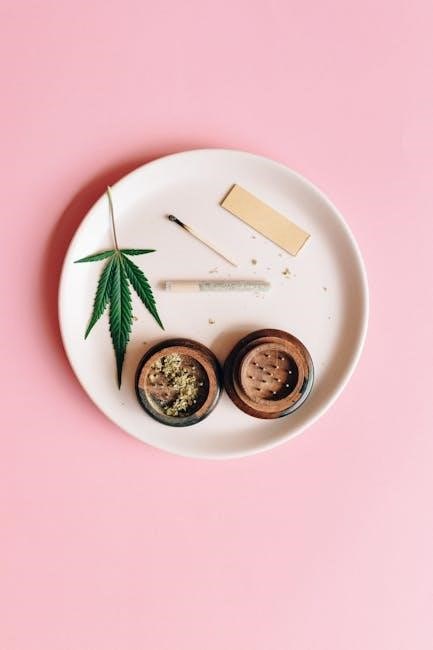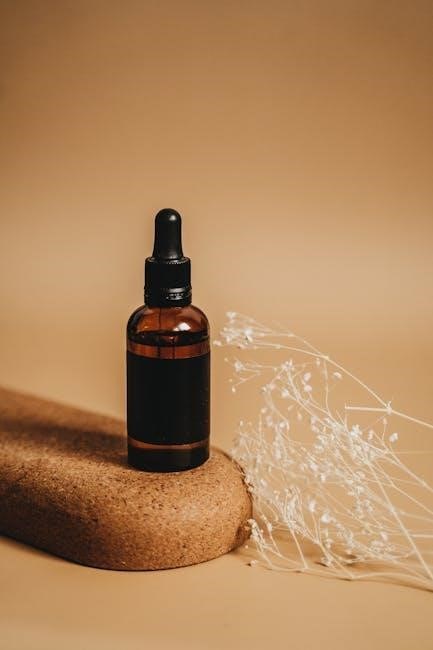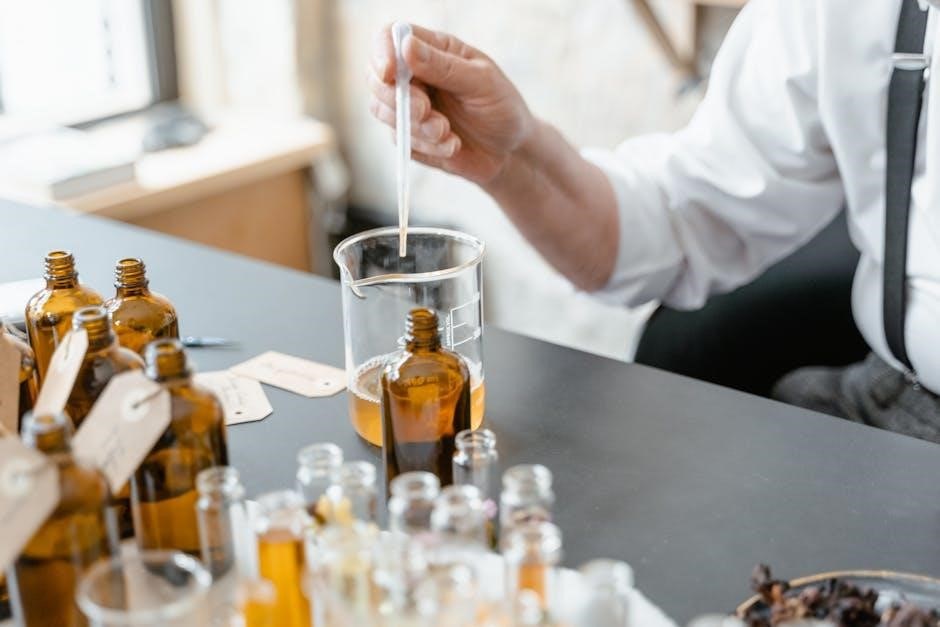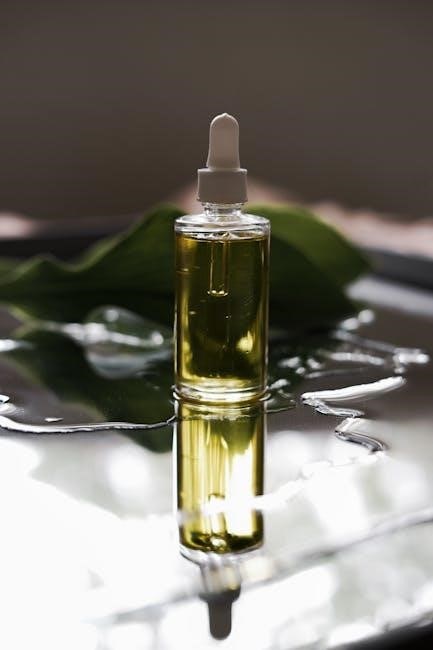
odie’s oil instructions
CBD oil, a natural compound from the cannabis plant, has gained popularity for its potential health benefits․ It can be used sublingually, topically, or as edibles․ Starting with a low dose and choosing high-quality products ensures optimal effects and safety․
What is CBD Oil?
CBD oil is a natural extract derived from the cannabis plant, specifically from the hemp variety․ It contains cannabidiol (CBD), a non-psychoactive compound that interacts with the body’s endocannabinoid system․ Unlike THC, CBD does not produce a “high․” CBD oil is typically extracted using methods like CO2 or solvent-based processes, ensuring purity and potency․ It is often blended with carrier oils, such as coconut or hemp seed oil, for easier absorption․ CBD oil is versatile, offering potential benefits for pain relief, anxiety, and sleep․ Its legal status varies by region, but it is generally accepted as a wellness product due to its low THC content․
Benefits of Using CBD Oil
CBD oil offers numerous health benefits, including pain relief, reduced inflammation, and anxiety alleviation․ It promotes relaxation and improves sleep quality․ CBD also has skincare advantages, addressing acne and dermatological conditions․ Unlike THC, CBD is non-psychoactive, making it a safe option for daily use․ It interacts with the body’s endocannabinoid system, supporting overall wellness․ Many users find CBD oil helpful for managing stress and enhancing mental clarity․ Its natural properties make it a popular choice for those seeking alternative therapies without severe side effects․ Consistent use can lead to improved well-being, making CBD oil a versatile and beneficial addition to a health regimen․
Popularity and Legal Status
CBD oil has surged in popularity due to its natural properties and potential health benefits․ In the U․S․, its legality was clarified by the 2018 Farm Bill, which legalized hemp-derived CBD containing less than 0․3% THC․ Globally, its legal status varies, with many countries allowing it for medical or recreational use․ The growing acceptance of CBD oil is driven by its versatility in products like edibles, topicals, and vapes․ Its non-psychoactive nature has made it a mainstream choice for wellness․ However, regulations and certifications remain crucial to ensure quality and safety․ As awareness grows, CBD oil continues to gain traction worldwide․

Understanding CBD Oil
CBD oil is derived from the cannabis plant, primarily hemp, and contains cannabinoids like CBD and THC․ It’s extracted using methods like CO2 and ethanol, ensuring purity and potency․ Unlike hemp oil, CBD oil is rich in cannabinoids, offering therapeutic benefits without psychoactive effects, making it a popular choice for wellness․
Source and Extraction Methods
CBD oil is primarily sourced from the hemp plant, a variant of the cannabis sativa species․ Hemp is cultivated for its high CBD content and low THC levels․ Extraction methods like CO2 and ethanol are commonly used to separate cannabinoids from plant material․ CO2 extraction is preferred for its safety and ability to preserve natural compounds, while ethanol extraction is cost-effective and efficient․ The quality of the source material and extraction process significantly impact the final product’s purity and potency․ Lab testing ensures the oil meets safety and potency standards, making it crucial for consumers to choose reputable brands․
Difference Between Hemp Oil and CBD Oil
Hemp oil and CBD oil are often confused but differ in source and composition․ Hemp oil is extracted from the seeds of the cannabis sativa plant and contains minimal cannabinoids, including CBD․ It is rich in essential fatty acids and vitamins, making it popular for skincare and culinary use․ CBD oil, however, is derived from the flowers, leaves, and stalks of the hemp plant and is high in cannabidiol (CBD), a non-psychoactive compound․ CBD oil may also contain trace amounts of THC, depending on the extraction process․ While hemp oil is primarily used for nutritional and cosmetic purposes, CBD oil is sought after for its potential health benefits, such as pain relief and anxiety reduction․
Chemical Composition and Cannabinoids
CBD oil contains a variety of cannabinoids, with cannabidiol (CBD) being the most prominent․ Other cannabinoids include cannabigerol (CBG), cannabichromene (CBC), and tetrahydrocannabinol (THC), though THC levels are typically minimal․ These compounds interact with the body’s endocannabinoid system, influencing health and wellness․ CBD oil also includes terpenes, which are aromatic molecules known for their therapeutic properties, and flavonoids, plant compounds with antioxidant effects․ The combination of these elements creates the “entourage effect,” enhancing the oil’s potential benefits․ Full-spectrum CBD oil retains all natural compounds, while broad-spectrum removes THC, and CBD isolate contains only pure cannabidiol․ Understanding the chemical composition helps users choose the right product for their needs․

Methods of Using CBD Oil
CBD oil can be administered sublingually, applied topically, consumed orally as edibles, or vaporized․ Each method offers unique benefits and absorption rates for personalized use․
Sublingual Administration
Sublingual administration involves placing CBD oil drops under the tongue, where it absorbs quickly into the bloodstream․ This method bypasses the digestive system, offering faster effects․ To use, place the desired dose under your tongue using a dropper, hold for 30 seconds to a minute, then swallow․ This approach is ideal for rapid relief from pain, anxiety, or stress․ It’s discreet and easy to incorporate into daily routines․ Consistency is key for optimal results, as sublingual CBD can provide targeted benefits within 15-30 minutes․ Always start with a low dose and adjust as needed for personalized effectiveness․
Topical Application
Topical application involves applying CBD oil directly to the skin, targeting specific areas for localized relief․ It is commonly used to address pain, inflammation, and skin conditions․ To use, apply a few drops to the affected area, gently massage, and reapply as needed․ This method allows CBD to interact with cannabinoid receptors near the skin’s surface, providing rapid, localized effects without entering the bloodstream․ Topical CBD products, such as creams, balms, and salves, are ideal for muscle soreness, joint pain, and dermatological issues․ They offer a convenient, non-invasive way to experience CBD’s benefits, making them a popular choice for everyday use․
Oral Consumption (Edibles)
Oral consumption of CBD oil through edibles is a popular method for achieving systemic effects․ Edibles, such as gummies, capsules, or infused foods, allow CBD to be absorbed through the digestive system․ This method offers a slower onset but longer-lasting effects compared to sublingual use․ When consuming edibles, it’s important to start with a low dose and wait 1-2 hours to assess the effects․ Food can enhance absorption, so taking edibles with a meal may improve bioavailability․ Always choose high-quality, lab-tested products and follow the recommended dosage on the label․ Edibles are a convenient and discreet way to incorporate CBD into your daily routine․
Vaporization and Vaping
Vaporization and vaping are popular methods for consuming CBD oil, offering rapid absorption and quick effects․ CBD vape products, such as e-liquids, are heated to produce a vapor that is inhaled․ This method allows CBD to enter the bloodstream quickly through the lungs, providing immediate relief․ When vaping, it’s crucial to use high-quality, lab-tested products to avoid harmful additives․ Start with a low dose and adjust as needed․ Portable vape pens are convenient and discreet, making this method ideal for on-the-go use․ Always follow the manufacturer’s instructions and be mindful of temperature settings to ensure a safe and effective experience․

Dosing Guidelines
Start with a low dose, using a dropper for precise measurement․ Gradually adjust based on effects, ensuring optimal benefits and minimizing potential side effects․

How to Measure the Right Dosage
Measuring the right dosage of CBD oil is crucial for achieving desired effects․ Start by using the dropper provided with the bottle to accurately measure the oil․ Always check the label for the concentration of CBD per serving․ A typical dose ranges from 5 to 50 mg, depending on individual needs․ Begin with a low dose and gradually increase as needed․ Factors like weight, metabolism, and the reason for use can influence the optimal dosage․ Consult a healthcare professional for personalized advice․ Keep track of your doses and effects in a journal to refine your routine․ Allow 30-60 minutes between doses to assess effectiveness․
Starting with a Low Dose
Starting with a low dose of CBD oil is essential to ensure safety and effectiveness․ Begin with 5-10 mg per serving, allowing your body to adjust․ Use the dropper to measure accurately, as most bottles provide clear markings․ Start slow to avoid potential side effects and gradually increase as needed․ Consistency is key; take the same dose daily to observe effects․ Wait 30-60 minutes before reassessing, as CBD absorption varies․ Track your progress to identify the optimal dose for your needs․ Always consult a healthcare professional for personalized advice, especially if combining with other medications․ Patience is crucial when finding the right balance․
Adjusting the Dosage for Optimal Effects
After starting with a low dose, monitor your body’s response for a few days before adjusting․ If desired effects aren’t achieved, gradually increase the dose by 5-10 mg․ Pay attention to how your body reacts, as individual tolerance varies․ Track your progress in a journal to identify the ideal dose․ Be patient, as CBD effects can take time to manifest․ If side effects occur, reduce the dose or consult a healthcare professional․ Consistency is key—maintain the same schedule to gauge effectiveness accurately․ Adjusting wisely ensures a personalized experience, maximizing benefits while minimizing potential discomfort․

Health Benefits of CBD Oil
CBD oil offers numerous health benefits, including pain relief, reducing inflammation, and alleviating anxiety․ It also improves sleep quality and provides skincare advantages, promoting overall wellness naturally․
Pain Relief and Inflammation Reduction
CBD oil is widely recognized for its ability to alleviate pain and reduce inflammation․ By interacting with the body’s endocannabinoid system, it helps modulate pain signals and inflammation․ Many users report relief from chronic pain, arthritis, and muscle soreness․ Topical application can target specific areas, while sublingual use provides systemic effects․ Its natural anti-inflammatory properties make it a popular choice for those seeking alternatives to traditional pain medications․ CBD oil’s ability to address both pain and inflammation without psychoactive effects has made it a preferred option for many individuals seeking natural relief․
Anxiety and Stress Relief
CBD oil has shown promise in alleviating anxiety and stress by interacting with the body’s endocannabinoid system․ It helps regulate serotonin levels, which play a key role in mood regulation․ Many users report reduced anxiety symptoms, including those with social anxiety disorder and PTSD․ Sublingual or oral consumption is commonly recommended for systemic effects․ CBD oil’s calming properties can provide relief without psychoactive side effects, making it a natural alternative for managing stress and anxiety․ Consistent use and proper dosing are essential for optimal results, ensuring a balanced and relaxed state of mind․
Improving Sleep Quality
CBD oil has shown potential in improving sleep quality by addressing underlying issues like insomnia and restlessness․ It interacts with the body’s endocannabinoid system, promoting relaxation and reducing stress․ Many users report better sleep patterns when using CBD oil sublingually or orally before bedtime․ A low to moderate dose is often recommended to avoid grogginess․ CBD oil’s calming effects can help individuals fall asleep faster and enjoy deeper, more restorative sleep․ Regular use may lead to consistent improvements in sleep quality, making it a natural alternative for those struggling with sleep disorders without the risk of dependency․
Skincare and Dermatological Benefits
CBD oil offers significant benefits for skincare and dermatological health․ It is rich in antioxidants and has anti-inflammatory properties, making it effective in reducing skin irritation and inflammation․ CBD oil can help manage acne by regulating oil production and reducing bacterial growth․ It also moisturizes the skin, improving hydration and elasticity, which can combat dryness and signs of aging․ Additionally, CBD oil may alleviate symptoms of eczema, psoriasis, and other skin conditions by soothing redness and itching․ Topical application allows for targeted relief, making CBD oil a popular choice for natural skincare routines․ Always choose high-quality, lab-tested products for optimal results․
Safety and Precautions
CBD oil is generally safe but may cause side effects like fatigue or drowsiness․ Avoid using it with other medications without consulting a healthcare provider․ Ensure products are lab-tested for purity and potency to minimize risks․
Potential Side Effects
While CBD oil is generally well-tolerated, it may cause mild side effects such as fatigue, drowsiness, or changes in appetite․ Some users report diarrhea or slight weight changes․ These effects are typically mild and temporary․ In rare cases, CBD can interact with medications, especially blood thinners, and may worsen underlying health conditions․ It’s crucial to consult a healthcare provider before using CBD, especially if taking other medications or having a medical condition․ Individual tolerance varies, so starting with a low dose is recommended․ High-quality, lab-tested products minimize risks, ensuring safety and efficacy for most users․
Drug Interactions and Contraindications
Understanding potential drug interactions with CBD oil is crucial for safe use․ CBD can interact with medications like blood thinners, sedatives, and antidepressants by inhibiting liver enzymes, altering their effectiveness․ It may also enhance the effects of drugs metabolized by the cytochrome P450 system․ Individuals taking prescription medications should consult their healthcare provider before using CBD․ Additionally, CBD may not be suitable for those with liver conditions, as it can strain liver function․ Pregnant or breastfeeding women should avoid CBD due to insufficient research on its effects․ Always prioritize medical advice to ensure safe and effective use of CBD oil․
Quality and Lab Testing Importance
Ensuring the quality and safety of CBD oil is paramount, as the market is largely unregulated․ Look for products that undergo rigorous third-party lab testing to verify potency, purity, and safety․ These tests check for THC content, ensuring it stays below legal limits, and detect harmful contaminants like heavy metals or pesticides․ High-quality CBD oils are extracted using clean methods and sourced from hemp grown in regulated environments․ Always choose products with clear labeling and lab results available․ This ensures you’re getting a reliable and effective product, free from unwanted substances, and aligns with legal and safety standards․

Choosing the Right CBD Oil
Selecting the right CBD oil involves checking lab test results, ensuring THC levels are within legal limits, and verifying clear product labeling for potency and purity․
How to Read CBD Oil Labels
Reading CBD oil labels is crucial for ensuring quality and safety․ Look for the CBD concentration in milligrams, THC content (must be below 0․3%), and extraction method․ Check for lab testing certifications, which confirm purity and potency․ Verify the product’s ingredients and ensure no harmful additives are present․ The label should also display the manufacturer’s name and contact information․ Be wary of vague claims or unverified health benefits․ Always choose products with clear, detailed labeling and third-party lab results to ensure transparency and reliability․ This step helps in making an informed decision when selecting the right CBD oil for your needs․
Understanding THC Content
THC (tetrahydrocannabinol) is the psychoactive compound in cannabis․ CBD oil must contain less than 0․3% THC to be legal and non-intoxicating․ Labels should clearly state THC levels, ensuring compliance with regulations․ Full-spectrum products may have trace THC, while broad-spectrum or isolate options remove it entirely․ Understanding THC content helps avoid unintended psychoactive effects and ensures the product meets legal standards․ Always verify THC levels on lab reports to confirm the product’s safety and suitability for your needs․ This step is crucial for maintaining the non-intoxicating benefits of CBD while adhering to legal and personal preferences․
Brands and Product Reviews
Choosing a reputable brand is crucial for ensuring high-quality CBD oil․ Look for brands with third-party lab testing and transparent labeling․ Reading product reviews can provide insights into effectiveness, taste, and potency․ Many brands offer certifications and clear dosage guidelines, enhancing trust․ Be cautious of affiliate partnerships that may influence reviews․ Always verify the source of reviews to ensure authenticity․ Reputable brands prioritize customer satisfaction and safety, making them ideal choices for first-time users․ By researching brands and their products, you can make informed decisions tailored to your needs and preferences, ensuring a positive experience with CBD oil․

Legal Considerations
CBD oil’s legality varies globally․ In the U․S․, hemp-derived CBD with <0․3% THC is legal․ Check local laws to ensure compliance and safe usage․
Legality in Different Countries
The legality of CBD oil varies significantly across the globe․ In the U․S․, hemp-derived CBD with less than 0․3% THC is legal under the 2018 Farm Bill․ In the U․K․, CBD is legal if it contains no THC․ Canada allows CBD under strict regulations․ In Europe, countries like Germany and France permit CBD with THC below 0․2%․ Australia permits CBD for therapeutic use with a prescription․ In Asia, Japan and South Korea allow THC-free CBD, while others ban it entirely․ Always check local laws to ensure compliance and avoid legal issues when using or purchasing CBD oil․
Regulations and Certifications
Regulations for CBD oil vary by region, ensuring safety and quality․ In the U․S․, CBD must contain less than 0․3% THC to be legal under the 2018 Farm Bill․ The FDA regulates CBD products, prohibiting unapproved health claims․ In the U․K․, CBD must be THC-free and comply with Novel Food Regulations․ Third-party lab testing is crucial for verifying potency and purity․ Certifications like USDA Organic or GMP ensure high standards․ Always look for lab reports and reputable certifications when purchasing CBD oil to guarantee compliance with legal and safety standards․ These regulations protect consumers and maintain industry integrity․

Frequently Asked Questions
- How long does it take to feel effects? Effects typically begin within 15-60 minutes, depending on the method of consumption․
- Will CBD oil make me high? No, CBD is non-psychoactive and does not produce a “high” like THC․
- Can CBD oil be used for pets? Yes, CBD oil can be used for pets, but consult a vet for proper dosage and safety․
How Long Does It Take to Feel Effects?
The time it takes to feel the effects of CBD oil varies depending on the method of consumption․ Sublingual administration, where drops are placed under the tongue, typically shows effects within 15-30 minutes․ Oral consumption, such as edibles, may take 1-2 hours due to digestion․ Topical application can provide localized relief within 30 minutes to an hour․ Factors like metabolism, dosage, and individual tolerance also influence onset time․ Consistency is key, as CBD may take a few days to build up in the system for optimal results․ Always start with a low dose and adjust as needed for the best experience․
Will CBD Oil Make Me High?
CBD oil does not produce a “high” because it contains minimal levels of THC, the psychoactive compound in cannabis․ CBD is non-intoxicating and safe for use, making it legal in many countries․ Derived from hemp, CBD oil is designed to promote relaxation and well-being without altering mental state․ Users can enjoy its benefits without worrying about psychoactive effects․ Always choose products with less than 0․3% THC for assurance․ CBD oil is a natural, non-addictive alternative for those seeking relief without the risk of intoxication, ensuring a safe and controlled experience for all users․
Can CBD Oil Be Used for Pets?
CBD oil can be used for pets, as it is non-psychoactive and derived from hemp, making it safe for animals․ Many pet owners use CBD to help with pain, anxiety, and inflammation in their pets․ It works similarly to how it does in humans, interacting with the pet’s endocannabinoid system․ However, it’s crucial to consult a veterinarian before giving CBD to your pet, as the correct dosage and product formulation are essential; Choose CBD products specifically designed for pets to ensure safety and efficacy․ Always opt for high-quality, lab-tested CBD oil to provide the best care for your furry friends․
CBD oil offers natural relief for various ailments․ For best results, use consistently, choose high-quality products, and start with low doses, allowing time to feel effects;
Final Tips for Using CBD Oil
For optimal results, start with a low dose and gradually increase as needed․ Consistency is key, so incorporate CBD oil into your daily routine․ Choose high-quality, lab-tested products to ensure safety and effectiveness․ Always read labels carefully to understand THC content and other ingredients․ Experiment with different methods like sublingual, topical, or edibles to find what works best for you․ Keep track of your dosage and effects to refine your regimen․ Consult a healthcare professional before using CBD, especially if you’re on medication․ Patience is important, as effects may take time to manifest․ Prioritize quality and consistency for the best experience with CBD oil․
Encouragement for Further Research
Exploring the world of CBD oil is an ongoing journey, and staying informed is key to maximizing its benefits․ Researching reputable sources and scientific studies can provide deeper insights into its effects and uses․ Understanding the latest advancements in CBD oil, such as new delivery methods or emerging health benefits, can enhance your experience․ Consulting with healthcare professionals or specialists can also offer personalized guidance․ Encourage yourself to stay curious and proactive in learning about CBD oil, as knowledge empowers you to make informed decisions tailored to your needs and goals․

Additional Resources
Explore recommended guides, articles, and trusted retailers for high-quality CBD oil․ Check out expert reviews and comprehensive resources to enhance your understanding and purchasing experience․
Recommended Reading and Guides
For a deeper understanding, explore comprehensive guides on CBD oil benefits, usage methods, and dosage tips․ Check out expert articles and tutorials for precise instructions․ Discover how to incorporate CBD into your daily routine safely and effectively․ Look for trusted sources that offer detailed product reviews and brand recommendations․ Many guides also provide tips on choosing the right CBD oil for specific needs․ Additionally, find resources that explain the science behind CBD and its interaction with the body․ Always consult reputable websites and publications to ensure accuracy․ These resources will help you make informed decisions and maximize the potential benefits of CBD oil․
Where to Buy High-Quality CBD Oil
To ensure you purchase high-quality CBD oil, consider buying from reputable brands and licensed dispensaries․ Look for products that are lab-tested and have clear labels․ Online retailers like CBD-specific stores and wellness websites often offer a wide range of options․ Check for certifications like USDA Organic or third-party lab results to guarantee purity and potency․ Avoid unregulated marketplaces and always read reviews to verify the brand’s reliability․ Some popular options include well-known CBD brands and local health stores․ Remember, quality matters, so invest in products that align with your health goals and budget․